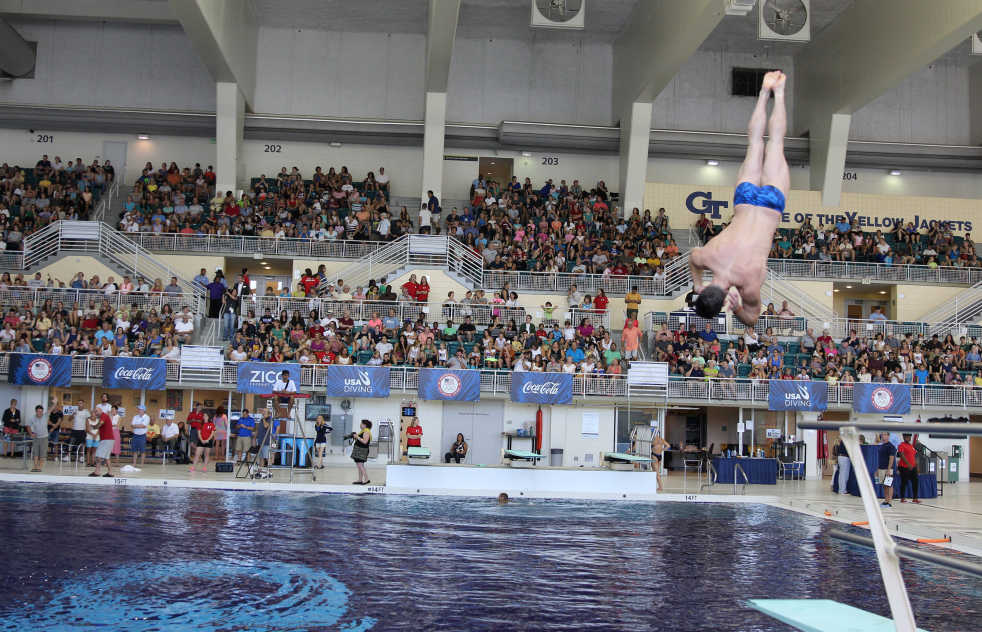The U.S. Olympic Diving Team spent the third week of July training for the 2016 Olympic games in Rio de Janeiro, Brazil, in the McAuley Aquatic Center on Tech’s campus. The team’s training was originally planned to take place in a camp in Puerto Rico, but in order to avoid exposure to the Zika virus, it chose to train in Atlanta instead.
The team’s choice to train at Tech is a particularly historic one, as 2016 marks the 20th anniversary of the 1996 Summer Olympic Games in Atlanta.
Tech welcomed the dive team with a Send-Off Celebration, where the 2016 Olympians were available for autographs, visited children’s hospitals and held open training sessions for those who wished to watch. Among the crowd were members of the 1996 Olympic dive team, who returned to the spot where they competed 20 years ago.
“We are excited to be returning to Atlanta and the site of the 1996 Games for our final preparation for the 2016 Games in Rio,” said Linda Paul, president and CEO of USA Diving.
“[The McAuley Aquatic Center] is such an exciting venue, and holds so many memories that it’s always a chills-on-the-bone type feeling when you walk in,” said David Pichler, one of the 1996 divers who returned to send off the 2016 team.
Past Olympians are not the only ones reflecting on the games. President emeritus Dr. G. Wayne Clough was president of Tech during the ’96 games, and remembers it as a catalyst for making Tech the University it is today. He credited past president John Patrick “Pat” Crecine for working to bring the games to Atlanta.
“When [Pat] got engaged in this process, this discussion of Atlanta competing for the Olympics, he really took it on, and I think made a huge difference,” Clough said. “He was a computer scientist, and very much advanced in his thinking about using flyovers, flythroughs and 3D technologies. He was able to show up at venues, and show how you would sit and it would look from here.”
Extensive renovations and construction had to be made to parts of Tech’s campus and most of it was unassisted by the games.
“In regards to Alexander Memorial Coliseum, I think they gave something like $8 million,” Clough said, “and Georgia Tech raised a lot more money to renovate the stadium at the time. When it came to the housing, again, they would only put up a limited amount of money, and through the good will of the State and Zell Miller at the time, Tech was able to borrow about $140 Million to add to the money and build the housing that we built.”
Students and faculty also played a significant part of the renovation effort.
“With the aquatic center, it was just a big, open structure,” said Clough. “It cost us about $90 million to enclose that, and the students were willing to put some of that in their fees, as well as the faculty, and we built a first-class recreation center.”
However, once the Olympics came to Tech, they were largely separate from the Institute.
“The Olympics have their own way of doing business, and they make that very clear,” Clough said. “What they did do was provide the momentum needed to expand Tech and improve the community. The games were a
nucleation for the idea of improving the neighborhoods around Tech … It was, politically, very difficult to do.”
Clough began what he called the “four points of the compass” approach to master planning, where the goal was to improve Tech’s campus, invite people to come be a part of it and to expand outward and improve the community and each part of the neighborhoods around Tech.
One of these neighborhoods was across the 5th Street Bridge, now Tech Square, but was once what Clough described as being “in shambles,” with vacant buildings and broken windows. The Institute worked with the Metro Chamber of Commerce and participated in a program called Central Atlanta Progress that focused on improving the city. “The idea was not to isolate campus, but to make it a part of Midtown. The goal was to say to the business community, ‘this is your entrée into Georgia Tech.’”
On the west side of Tech, Clough felt that Tech had an obligation to the historically black neighborhoods that wanted to come back and be a part of the community, so the Institute conducted an outreach program to work with local churches and the Atlanta University Center, a conglomerate of Historically Black Colleges and Universities in Atlanta. An effort that, Clough said, resulted in the new biotechnology center on North Avenue.
To the north, Tech helped to create a child-care center for Home Park, and directly to the south, Tech worked very closely with developers in the creation of Centennial Park
Place, which replaced the dilapidated Techwood Homes, one of the very first public housing projects in the U.S.
Clough believes these initiatives are a large part of what makes Tech the university that it is.
“We want to be seen as a place where breakthroughs happen,” Clough said. “We delivered everything we said we were going to deliver, on-time and on-budget.
“I think [the Olympians] came to Georgia Tech, they came to our campus, our venues and came away impressed.”
The U.S. Dive Team departed on Saturday, July 27; the U.S. Swim Team will stay for the duration of the month, leaving on Aug. 1.
